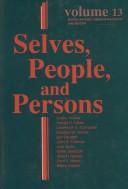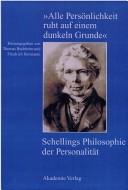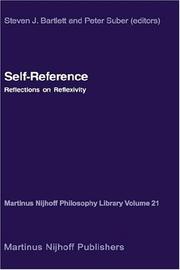| Listing 1 - 10 of 96 | << page >> |
Sort by
|
Book
ISBN: 9781462505111 1462505112 Year: 2012 Publisher: New York, NY : Guilford Press,
Abstract | Keywords | Export | Availability | Bookmark
 Loading...
Loading...Choose an application
- Reference Manager
- EndNote
- RefWorks (Direct export to RefWorks)
Self-perception. --- Subconsciousness. --- Personality (Theory of knowledge) --- Self-perception --- Subconsciousness

ISBN: 0268017476 Year: 1992 Publisher: Notre Dame University of Notre Dame press
Abstract | Keywords | Export | Availability | Bookmark
 Loading...
Loading...Choose an application
- Reference Manager
- EndNote
- RefWorks (Direct export to RefWorks)
Personality (Theory of knowledge) --- Philosophical anthropology --- Self (Philosophy)

ISBN: 3050040440 Year: 2004 Publisher: Berlin Akademie Verl.
Abstract | Keywords | Export | Availability | Bookmark
 Loading...
Loading...Choose an application
- Reference Manager
- EndNote
- RefWorks (Direct export to RefWorks)
Book
Year: 1942 Publisher: Leipzig : E.A. Seemann,
Abstract | Keywords | Export | Availability | Bookmark
 Loading...
Loading...Choose an application
- Reference Manager
- EndNote
- RefWorks (Direct export to RefWorks)
Geschichtsphilosophie. --- Geschichtsphilosophie. --- History --- History --- Perception (Philosophy). --- Perception (Philosophy). --- Personality (Theory of knowledge). --- Personality (Theory of knowledge). --- Philosophy. --- Philosophy. --- Herder, Johann Gottfried ((von)). --- Herder, Johann Gottfried von, --- Herder, Johann Gottfried, --- Herder, Johann Gottfried,
Book
ISSN: 03448142 ISBN: 9783110202946 3110202948 Year: 2008 Volume: 87 Publisher: Berlin ; New York Walter de Gruyter
Abstract | Keywords | Export | Availability | Bookmark
 Loading...
Loading...Choose an application
- Reference Manager
- EndNote
- RefWorks (Direct export to RefWorks)
Truth --- Reference (Philosophy) --- Personality (Theory of knowledge) --- Heidegger, Martin, --- Truth. --- Personality (Theory of knowledge). --- Reference (Philosophy). --- Conviction --- Belief and doubt --- Philosophy --- Skepticism --- Certainty --- Necessity (Philosophy) --- Pragmatism --- Referring, Theory of --- Theory of referring --- Knowledge, Theory of --- Heidegger, Martin, - 1889-1976 - Sein und Zeit

ISBN: 9024734746 9401080887 940093551X 9789024734740 Year: 1987 Volume: 21 Publisher: Dordrecht Nijhoff
Abstract | Keywords | Export | Availability | Bookmark
 Loading...
Loading...Choose an application
- Reference Manager
- EndNote
- RefWorks (Direct export to RefWorks)
Philosophical anthropology --- Developmental psychology --- Self-knowledge, Theory of --- Introspection (Theory of knowledge) --- Knowledge, Reflexive --- Knowledge of self, Theory of --- Reflection (Theory of knowledge) --- Reflexive knowledge --- Knowledge, Theory of --- Personality (Theory of knowledge) --- Self (Philosophy)
Book
ISSN: 0298315X ISBN: 9782204087742 2204087742 Year: 2008 Publisher: Paris Cerf
Abstract | Keywords | Export | Availability | Bookmark
 Loading...
Loading...Choose an application
- Reference Manager
- EndNote
- RefWorks (Direct export to RefWorks)
L'accomplissement de soi est la grande inquiétude de la modernité, car l'individu se cherche là où il n'est pas : soit dans une intériorité close où, à force d'être face à lui-même, il n'éprouve plus que le vide de son être, soit dans la pure extériorité des relations mondaines qui le dispersent. Entre le retour indéfini sur soi et l'éclatement de soi par le monde, il ne sait plus qui il est et comment se rassembler. La revalorisation actuelle de la posture stoïcienne de la citadelle intérieure révèle une angoisse irrépressible face à la possibilité d'être soi dans le monde. En réponse à cette mise en question, la construction d'un bunker de l'intériorité ne peut donner qu'une illusion de liberté. La philosophie médiévale (saint Augustin, saint Thomas d'Aquin) propose une autre façon d'être soi, de se soucier de soi, dans laquelle l'immensité non maîtrisable de notre intériorité devient lieu d'ouverture et de réponse à l'altérité. Tout notre être, y compris notre sensibilité, peut et doit participer à la recherche de la sagesse ; il y a ainsi une sagesse fondamentale des passions. La métaphysique de la subjectivité (Kierkegaard) et la phénoménologie contemporaine (Husserl, Binswanger, Lévinas et Maldiney) réactualisent, après des siècles d'oubli, cette affectivité comme source d'une intériorité vivante, c'est-à-dire ouverte. Le témoignage, la patience et la compassion montrent qu'il n'y a pas de devoir sans affection et qu'il n'est possible d'être soi qu'en s'exposant à l'événement. Entre l'intériorité d'île et l'intériorité d'exil, l'homme doit choisir son style d'existence : être en exil et vivre, ou rester en soi et mourir
Philosophical anthropology --- Self-knowledge, Theory of --- Other (Philosophy) --- Introspection (Theory of knowledge) --- Knowledge, Reflexive --- Knowledge of self, Theory of --- Reflection (Theory of knowledge) --- Reflexive knowledge --- Alterity (Philosophy) --- Otherness (Philosophy) --- Knowledge, Theory of --- Personality (Theory of knowledge) --- Self (Philosophy) --- Philosophy
Book
Abstract | Keywords | Export | Availability | Bookmark
 Loading...
Loading...Choose an application
- Reference Manager
- EndNote
- RefWorks (Direct export to RefWorks)
Book
ISBN: 1283380005 9786613380005 1400842972 9781400842971 9781283380003 Year: 2012 Publisher: Princeton, NJ
Abstract | Keywords | Export | Availability | Bookmark
 Loading...
Loading...Choose an application
- Reference Manager
- EndNote
- RefWorks (Direct export to RefWorks)
Since Socrates, and through Descartes to the present day, the problems of self-knowledge have been central to philosophy's understanding of itself. Today the idea of ''first-person authority''--the claim of a distinctive relation each person has toward his or her own mental life--has been challenged from a number of directions, to the point where many doubt the person bears any distinctive relation to his or her own mental life, let alone a privileged one. In Authority and Estrangement, Richard Moran argues for a reconception of the first-person and its claims. Indeed, he writes, a more thorough repudiation of the idea of privileged inner observation leads to a deeper appreciation of the systematic differences between self-knowledge and the knowledge of others, differences that are both irreducible and constitutive of the very concept and life of the person. Masterfully blending philosophy of mind and moral psychology, Moran develops a view of self-knowledge that concentrates on the self as agent rather than spectator. He argues that while each person does speak for his own thought and feeling with a distinctive authority, that very authority is tied just as much to the disprivileging of the first-person, to its specific possibilities of alienation. Drawing on certain themes from Wittgenstein, Sartre, and others, the book explores the extent to which what we say about ourselves is a matter of discovery or of creation, the difficulties and limitations in being ''objective'' toward ourselves, and the conflicting demands of realism about oneself and responsibility for oneself. What emerges is a strikingly original and psychologically nuanced exploration of the contrasting ideals of relations to oneself and relations to others.
Book
ISBN: 1282190865 9786612190865 1443807109 9781443807104 9781282190863 6612190868 Year: 2007 Publisher: Newcastle, UK : Cambridge Scholars Publishing,
Abstract | Keywords | Export | Availability | Bookmark
 Loading...
Loading...Choose an application
- Reference Manager
- EndNote
- RefWorks (Direct export to RefWorks)
We cannot live a full life unless we know who we are, unless we know the essence of our being. The sciences, which have been immensely helpful in the way in which we live our lives, have been helpless when it comes to telling us how our life should be lived and what its meaning is. Accepting any philosophical or religious belief, on the other hand, limits our freedom to learn directly from personal knowledge of reality, as any preconceived ideas do not only alter its perception, but limit the...
Life. --- Self-knowledge, Theory of. --- Introspection (Theory of knowledge) --- Knowledge, Reflexive --- Knowledge of self, Theory of --- Reflection (Theory of knowledge) --- Reflexive knowledge --- Knowledge, Theory of --- Personality (Theory of knowledge) --- Self (Philosophy) --- Life --- Philosophy
| Listing 1 - 10 of 96 | << page >> |
Sort by
|

 Search
Search Feedback
Feedback About UniCat
About UniCat  Help
Help News
News